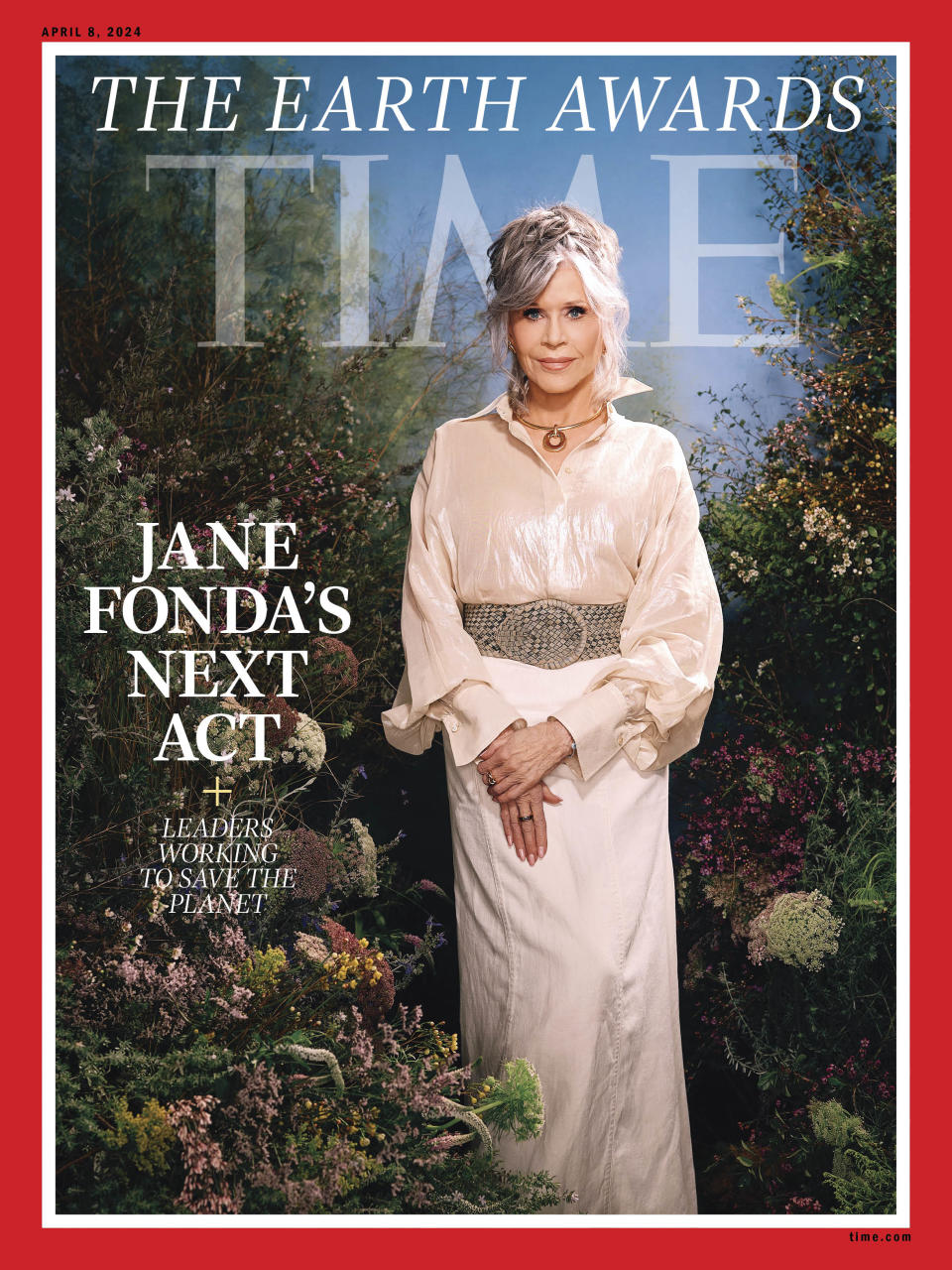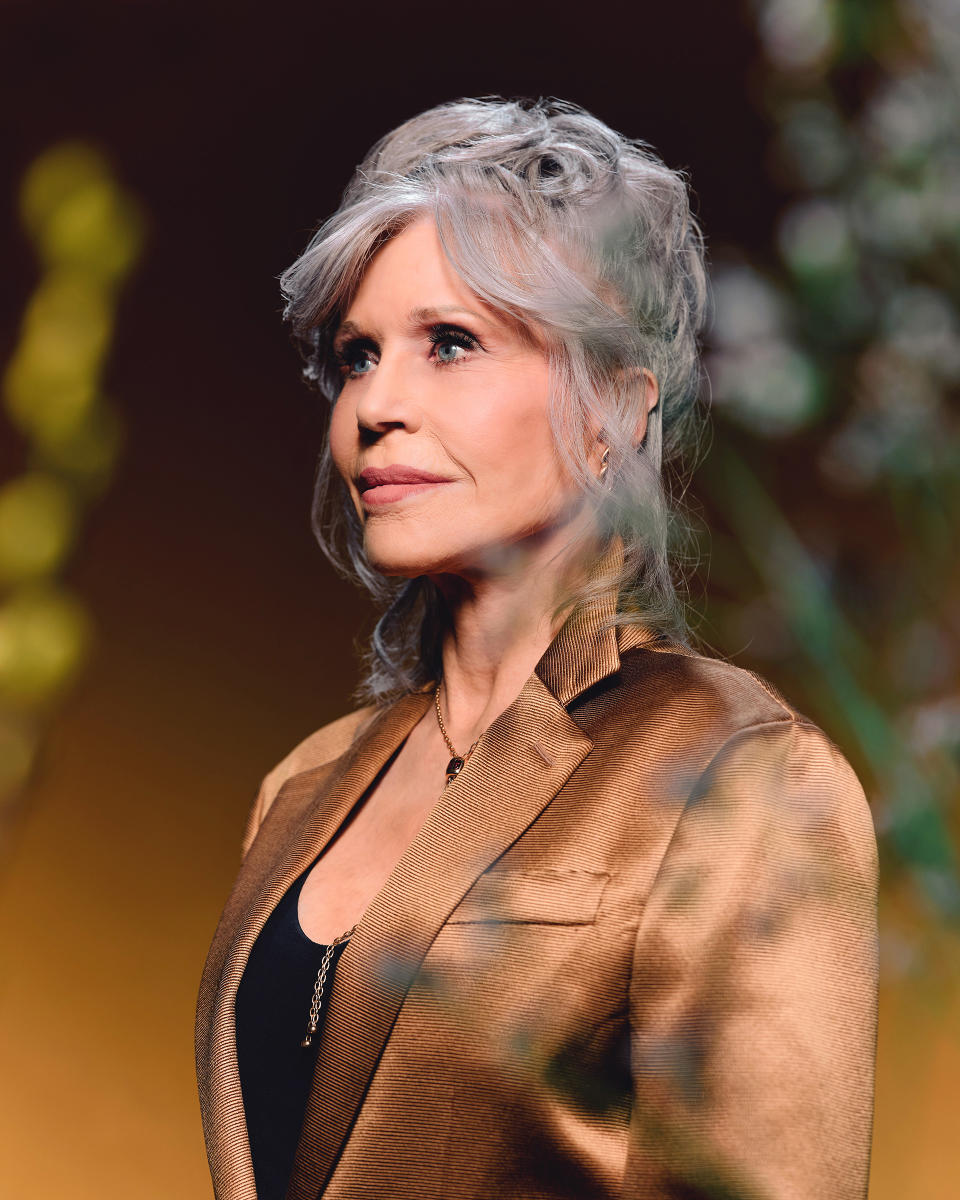Jane Fonda Champions Climate Action for Every Generation
- Oops!Something went wrong.Please try again later.
- Oops!Something went wrong.Please try again later.
- Oops!Something went wrong.Please try again later.
- Oops!Something went wrong.Please try again later.
Jane Fonda, at 86, is small-boned and elegant, her eyes like soft blue-gray flannel. Yet it’s startling how much energy shoots through her via a simple handshake: if a woodland creature could shake your hand, it might feel like this, the will of an entire forest ecosystem pouring through one being. She’s physically strong, sitting up straight and tall for more than an hour on a backless ottoman, perched before a cozy sitting-room fireplace in her Los Angeles town house. But the message telegraphed by her handshake is less a matter of muscle tone than of pure urgency. If you could put it into words, it would be this: There’s not much time left.
Fonda has already lived many lives. The daughter of a much loved actor and a socialite, Henry Fonda and Frances Ford Seymour, she has built an astonishing acting career herself: In the space of just a few years, she shifted from the campy delights of Barbarella to career-defining performances in Klute and They Shoot Horses, Don’t They? Younger audiences know her from the Book Club movies and the hit TV series Grace and Frankie. And although it’s now common for actors to support causes they care about, vocally and financially, Fonda is the OG actor-activist. In the early 1970s she supported Native American causes and spoke out on behalf of the Black Panthers. She’s fought for civil rights and issues directly affecting women’s welfare, though she may be best known for her anti–Vietnam War stance in the 1970s—in particular, a photograph of her perched on an anti-aircraft gun taken during a 1972 trip to Hanoi. Fonda has apologized repeatedly and profusely over the years for that photo, knowing how hurtful it was to GIs and veterans. She knows what it’s like to be embattled, and to go to battle for principles she believes in. But in 2019 Fonda had a breakthrough that, as she describes it, was bigger than any revelation she’s had in decades of both acting and activism.

She’d felt a growing sense of alarm a year earlier, during the 2018 California wildfires. “The skies here were orange-brown,” she recalls. “I read that birds were dropping dead out of the sky over New Mexico and Arizona. They couldn’t make their normal migratory journey over the coast because of the wildfires. So they were flying over the deserts, and they were dying of dehydration and hunger.” Fonda spent her early years in the hills of California in the 1940s when there were no freeways and no smog. She remembers the sounds of meadow-larks, nightingales, mourning doves. “You don’t hear them anymore. I went into a downward spiral. I realized, it’s happening now. This isn’t something in the future. I’ve marched, I’ve protested. But given my platform, I’m not doing what I can do. And this could be the end. I have to commit myself more.”
Read More: It May Not Be Long Before We’re All Suffering from Climate Trauma
Fonda’s resolve intensified when the galleys for Naomi Klein’s 2019 Green New Deal manifesto On Fire landed on her doorstep, just as she was heading off to Big Sur for Labor Day weekend. She was so shaken by Klein’s book that she immediately called Annie Leonard, then head of Greenpeace USA. “This was not a cause,” says Fonda. “This was not a specific war in a specific place, or a specific group of people fighting for rights. This was human civilization we’re talking about. I just realized it in the core of my body. This is the moment I have to completely show up with everything I have.” We’re the first generation to experience the climate crisis, she says, and we’re the last that can do anything about it. “I want to be part of the generation that does something about it, because this is it.”
Feelings of despair are understandable in the face of imminent climate disaster. But they can also be a retreat, a means of leaving the hard work of changemaking to someone else. It’s not in Fonda’s nature to feel that kind of helplessness: “I’ve never despaired before. I’m not a despairing person.” But not even she knew exactly what she ought to be doing, which is why she called Leonard, who promptly set up a call with Klein, climate activist Bill McKibben, and environmental lawyer Jay Halfon. “I wanted to raise a ruckus,” Fonda says. So together, the group came up with the idea of planning an act of civil disobedience every Friday, inspired by protests like Randall Robinson’s 1980s antiapartheid sit-ins outside the South African embassy, as well as by the actions of Fridays for Future, the youth movement organized by Greta Thunberg in 2018. Young people, Fonda says, “were asking for us. They were saying, ‘We didn’t create this crisis, but it’s our future that’s going to be destroyed. Where are the older people to join us?’ So I said, ‘I’m here. I volunteer.’”
The first Fire Drill Friday was held on Oct. 11, 2019, with Fonda appearing on the steps of the Capitol in a black-and-white houndstooth newsboy cap and a three-alarm-red coat. Only about 50 people showed up to hear the speakers and experts who’d been scheduled to appear, though that number would swell in the coming weeks. Fonda was arrested that day—photos show her holding her zip-tied wrists high, a badge of honor. And although this wasn’t her first arrest (she’d been arrested once in 1970, at the behest of the Nixon White House on suspicion of drug possession, and several times by military police during anti–Vietnam War protests), it was the first time she’d been detained for civil disobedience. She would be arrested a total of five times—spending one night in jail—across the 14 Fire Drill Friday protests held in D.C. through Jan. 10, 2020.
The pandemic forced Fire Drill Fridays to move its protests and educational sessions online, and though the last virtual event was held on Jan. 5, the movement’s momentum continues. One thing Fonda learned from the experience is that Americans do care about climate issues. Data collected by the Yale Program on Climate Change Communication in autumn 2023 show that an estimated 72% of Americans believe climate change is happening, and some 70% believe it will harm plants and animals as well as future generations of humans. The whole point, Fonda says, is to let people know they’re needed. As attendance at Fire Drill Fridays grew, it was, Fonda says, mostly older women who showed up, “women who’d never been to a rally before.” When people are asked why they haven’t taken any action in response to the climate crisis, the answer, Fonda says, is often simply that nobody asked them. “So I say the great unasked is our target. Let’s turn that concern into action.”

When you spend an hour or two with a person who cares passionately about a particular issue, their idealism tends to fill the air, sometimes to the point of crowding out the human being sitting in front of you. This is even somewhat true of Fonda, not because there’s anything recessive about her, but because her mission seems to have set every molecule of her being ablaze. She’s the same Jane Fonda we think we all know—and yet more. She speaks of how the climate crisis affects women more negatively than men, particularly in the Global South. She makes a brief reference to her own recent cancer diagnosis—she was treated for non-Hodgkin lymphoma in 2022 and is now in remission—as a springboard to talk about the prevalence of cancer in communities located near refineries, oil wells, and fracking facilities, not to mention the fossil-fuel pollution that surrounds us all. She speaks with urgency about the upcoming election, whose outcome could determine the fate of the planet. In 2022, she and a small board of advisers established the Jane Fonda Climate PAC to help elect “climate champions,” particularly down ballot, where, she says, “the robust work on climate is happening. Mayors, city councils, boards of supervisors, county executives ... are the people that can create a whole climate plan, make it more resilient in your city or community.”
Read More: Column: You Can’t Have Healthy People On a Sick Planet
The political action committee is already in high gear for this year’s elections. Candidates are begging for its endorsement, and Fonda says they go through a rigorous vetting process—and they absolutely cannot take money from the fossil-fuel industry. “This is probably the most important election. The problem is we say this all the time, only this time it’s really true. Who gets elected in the United States in November is going to greatly determine whether there’s a future.”
But even Fonda, whose passion and commitment are so exemplary, is more than just the sum of the issues she cares about. In her book What Can I Do? My Path From Climate Despair to Action, she writes of being in that jail cell and wondering what the late Tom Hayden, a brilliant activist and one of her three ex-husbands, would think of her. He was a great strategist. How would he advise her and her compatriots to proceed? In the next paragraph, though, she wonders if she would have had the nerve to move to D.C. and launch a project as ambitious as Fire Drill Fridays if Hayden were still alive. When I ask her about this moment of self-questioning, she replies, more mischievously than evasively, “Did I say that? Hmm.” Then she elaborates.
“I was in awe of Tom. His intellect, the depth of his understanding of what needed to happen and how to make it happen. I was always kind of in the student role with him. And I don’t think he respected me very much, or at least he made me feel that I was stupid. And so I think he would have probably tried to talk me out of it. Or I would have been afraid that he wouldn’t have approved.” The point of this story isn’t to paint self-doubt as weakness, but to show how getting beyond it is often what pushes any of us to leap further and higher than we ever thought we could go. “I guess one of the reasons I’m so involved is, I’m 86 years old. I have a feeling that people can say, ‘Look at what she’s doing at her age! If she can do it, I can do it.’”
Read More: From ‘Hanoi Jane’ to the Workout: A Brief History of Jane Fonda’s Activism
The first step out of despair is simply showing up. We’ve already had brief moments last year where global average temperatures surpassed the 1.5°C temperature increase that scientists say we must avoid, she says. “But we can go back again—we can reduce it. It’s going to require incredibly brave and bold actions. And we can be brave and bold.”
—
Set design by Ali Gallagher and Zoran Radanovich; styled by Cristina Ehrlich; hair by Jonathan Hanousek; make-up by David DeLeon at ASM
Contact us at letters@time.com.

